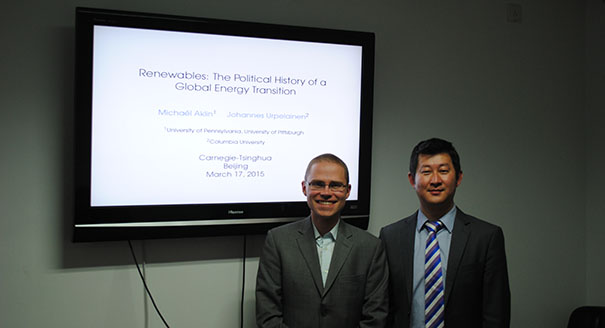Registration
You will receive an email confirming your registration.
Over the past year, the dramatic drop in oil prices has reduced the short-term economic incentives for developing renewable energy technologies. Beyond price fluctuations, political interests and public opinion also influence whether countries embrace renewable technologies or remain focused on carbon-based energy sources.
Carnegie–Tsinghua’s Zhang Chuanjie hosted a discussion with Johannes Urpelainen and Wang Tao about what empirical evidence from several countries reveals about the economic and political dimensions of global energy markets. They examined how energy costs, environmental policy, and public opinion influence the viability of the renewable energy sector around the world.
Discussion Highlights
- Motivations Behind the Renewables Market: Panelists described the growth in renewables as a response to rapid spikes in oil prices in the 1970s and public misgivings about nuclear power after the Three Mile Island and Chernobyl reactor accidents. Beyond these proximate motivations, panelists added that policymakers in many countries have embraced renewables to diversify their energy grids, to reduce dependence on carbon-based energy sources, and to address climate change.
Exceptional But Uneven Growth: By 2010, renewables accounted for nearly 6 percent of global energy production, vastly exceeding IEA projections of reaching 3 percent by 2020, according to panelists. They pointed out that countries such as Denmark and Germany have been investing heavily in renewables and have ambitious national plans for sustainable electricity generation that go far beyond the EU’s stated goal of producing 35 percent of electricity with renewables by 2020. By contrast, other Western countries like the United Kingdom and the United States have taken a more gradual approach with more modest benchmarks.
Politicized Renewables Investment: Panelists explained that as early renewables investments expanded, energy production became a contested political issue. In countries such as Denmark and Germany, proponents of high investment in renewables won the public debate early on, which led these countries to expand their sustainable energy sectors relatively quickly, participants noted. By contrast, the heavy industry and fossil fuels lobbies in the United States used political opposition to renewable energy subsidies and energy production regulations to successfully impede investments in renewable energy technologies from the 1980s until the mid-2000s. Since then, however, the United States has expanded investment in wind turbines, solar panels, and other renewables technology.
Clean Energy Development in China: Panelists pointed out that China is the world’s leading investor in renewables technology, having spent a record 89 billion dollars on clean energy in 2014. Capitalizing on this momentum, China has become not only a prominent user but also a top producer of renewables technologies, according to participants. They explained that China already boasts an extensive network of hydropower dams as well as growing wind and solar industries. This development seems to indicate a strong government response to citizens’ growing awareness of environmental challenges.
Remaining Challenges For Renewables: Although the rapid growth of renewables marks tangible progress, technical and political issues still pose challenges to greater expansion, panelists asserted. Wind and solar power technologies must be adapted to account for fluctuations in weather conditions and energy demand. Subsidies for clean energy firms must be gradually reduced to encourage sound business practices and profitability as governments and investors increasingly emphasize cost containment and quality control.
Zhang Chuanjie
Zhang Chuanjie is a resident scholar at the Carnegie–Tsinghua Center for Global Policy. His research interests include U.S.-China relations and public opinion analysis.
Johannes Urpelainen
Johannes Urpelainen is an associate professor in Columbia University’s political science department. His research interests include environmental politics, energy policy, and international cooperation on sustainability initiatives.
Wang Tao
Wang Tao is a resident scholar in the Energy and Climate Program based at the Carnegie–Tsinghua Center for Global Policy. His research interests include unconventional oil and natural gas as well as China’s energy policy.
